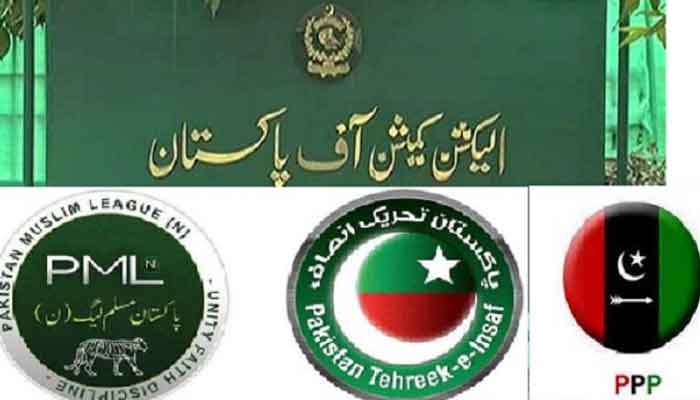ECP begins PTI, PML-N, PPP accounts audit
On the complaints of political parties against each other on charges of illegal funding, the ECP’s Political Finance Wing (PFW) stands activated with the appointment of Zameer Ahmed as its director general, who belongs to the Audit and Accounts Service.
ISLAMABAD: In a first, the Election Commission of Pakistan (ECP) has started auditing accounts of three major political parties — Pakistan Tehreek-e-Insaf (PTI), Pakistan Muslim League-Nawaz (PML-N) and Pakistan People’s Party (PPP).
On the complaints of political parties against each other on charges of illegal funding, the ECP’s Political Finance Wing (PFW) stands activated with the appointment of Zameer Ahmed as its director general, who belongs to the Audit and Accounts Service.
The PFW will also scrutinise assets of parliamentary leaders and members of the Parliament (MPs), and information would be obtained from the Federal Board of Revenue (FBR), the National Accountability Bureau (NAB) and the Federal Investigation Agency (FIA).
According to Article 17(3) of the Constitution, “Every political party shall account for the source of its funds in accordance with law.” Similarly, Article 4 of The Political Parties Rules (2002) says: “Every political party shall maintain its accounts in the manner set-out in Form-I indicating its income and expenditure, sources of funds, assets and liabilities and shall, within sixty days from the close of each financial year (July-June), submit to the Election Commission a consolidated statement of accounts of the party audited by a Chartered Accountant, accompanied by a certificate, duly signed by the Party Leader to the effect that no funds from any source prohibited under the Order were received by the party and that the statement contains an accurate financial position of the party.”
The financial affairs of political parties are a neglected affair in the ongoing accountability process. Most political parties fail to submit their annual income tax return with details of their expenses, donations and donors though it is binding upon them under the Income Tax Ordinance 2001. Failure on part of the FBR in not enforcing this law exposes the state of governance.
Similarly, the parliamentarians are also required to file their assets details with the ECP, and their income/wealth statements with the FBR. The ECP can seek help from NAB, FIA, FBR and other agencies to probe any suspected increase in assets or wealth of a person as the commission it lacks capacity to do this investigative job. The parliamentarians’ asset details would be compared with their declaration two years back.
-
 Bad Bunny Stunned Jennifer Grey So Much She Named Dog After Him
Bad Bunny Stunned Jennifer Grey So Much She Named Dog After Him -
 Kim Kardashian's Plans With Lewis Hamilton After Super Bowl Meet-up
Kim Kardashian's Plans With Lewis Hamilton After Super Bowl Meet-up -
 Prince William Traumatised By ‘bizarre Image’ Uncle Andrew Has Brought For Royals
Prince William Traumatised By ‘bizarre Image’ Uncle Andrew Has Brought For Royals -
 David Thewlis Gets Candid About Remus Lupin Fans In 'Harry Potter'
David Thewlis Gets Candid About Remus Lupin Fans In 'Harry Potter' -
 Cardi B And Stefon Diggs Spark Breakup Rumours After Super Bowl LX
Cardi B And Stefon Diggs Spark Breakup Rumours After Super Bowl LX -
 Alix Earle And Tom Brady’s Relationship Status Revealed After Cosy Super Bowl 2026 Outing
Alix Earle And Tom Brady’s Relationship Status Revealed After Cosy Super Bowl 2026 Outing -
 Why King Charles Has ‘no Choice’ Over Andrew Problem
Why King Charles Has ‘no Choice’ Over Andrew Problem -
 Shamed Andrew Wants ‘grand Coffin’ Despite Tainting Nation
Shamed Andrew Wants ‘grand Coffin’ Despite Tainting Nation -
 Keke Palmer Reveals How Motherhood Prepared Her For 'The Burbs' Role
Keke Palmer Reveals How Motherhood Prepared Her For 'The Burbs' Role -
 King Charles Charms Crowds During Lancashire Tour
King Charles Charms Crowds During Lancashire Tour -
 ‘Disgraced’ Andrew Still Has Power To Shake King Charles’ Reign: Expert
‘Disgraced’ Andrew Still Has Power To Shake King Charles’ Reign: Expert -
 Why Prince William Ground Breaking Saudi Tour Is Important
Why Prince William Ground Breaking Saudi Tour Is Important -
 AOC Blasts Jake Paul Over Bad Bunny Slight: 'He Makes You Look Small'
AOC Blasts Jake Paul Over Bad Bunny Slight: 'He Makes You Look Small' -
 At Least 53 Dead After Migrant Boat Capsizes Off Libya
At Least 53 Dead After Migrant Boat Capsizes Off Libya -
 'God Of War' Announces Casting Major Key Role In Prime Video Show
'God Of War' Announces Casting Major Key Role In Prime Video Show -
 Real Reason Prince William, Kate Broke Silence On Andrew Scandal Revealed
Real Reason Prince William, Kate Broke Silence On Andrew Scandal Revealed




